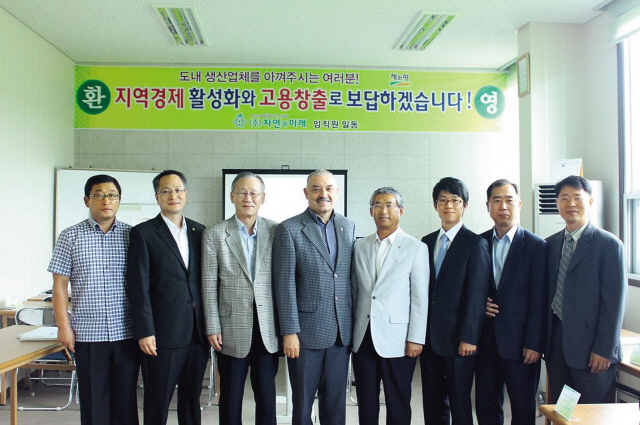Paraguayan land, Korean tech ideal match in agribusiness
By Korea HeraldPublished : Sept. 2, 2012 - 20:28
A combination of Paraguay’s wealth of arable land and Korean agricultural technology is leading to new business opportunities for the two countries.
A team of seven small businesses in South Jeolla Province on Aug. 23 signed a memorandum of understanding with CDD, a Paraguayan conglomerate with more than 30,000 hectares of agricultural land, to provide agricultural products and expertise for the growing of rice and other crops. CDD came into contact with Korean businesses through the Paraguayan pavilion at the Yeosu Expo that finished its three-month run last month.
The Bureau of Cooperation in Agriculture, Manufacturing and Commerce, and Paraguayan Ambassador Ceferino Adrian Valdez Peralta, were part of the delegation that visited businesses in South Jeolla Province to secure business ties in Paraguay last month. The bureau is a recently formed organization made of the Paraguayan Chamber of Commerce, the Small and Medium Business Administration and Korean businesses.
A team of seven small businesses in South Jeolla Province on Aug. 23 signed a memorandum of understanding with CDD, a Paraguayan conglomerate with more than 30,000 hectares of agricultural land, to provide agricultural products and expertise for the growing of rice and other crops. CDD came into contact with Korean businesses through the Paraguayan pavilion at the Yeosu Expo that finished its three-month run last month.
The Bureau of Cooperation in Agriculture, Manufacturing and Commerce, and Paraguayan Ambassador Ceferino Adrian Valdez Peralta, were part of the delegation that visited businesses in South Jeolla Province to secure business ties in Paraguay last month. The bureau is a recently formed organization made of the Paraguayan Chamber of Commerce, the Small and Medium Business Administration and Korean businesses.

Agriculture is one of the most promising areas for Korean small firms in Paraguay, which has a land area four times that of Korea but a population of just 6.8 million people. Paraguay mostly exports food and agricultural products such as beef and soybeans here, while automobiles make up the bulk of Korean imports to the country.
The Korea Trade Investment Promotion Agency is set to open a branch in the country next month, the 13th in Latin America. Korea and Paraguay also signed an open skies accord in May, paving the way for unlimited flights by Korean carriers to the country. There are some 5,200 Koreans living in Paraguay, according to the Overseas Koreans Foundation.
Eco-friendly farming
Among other products, the group of firms in South Jeolla Province wants to export pesticides, fertilizers and shortage methods to the Latin American country. The leader of the group of firms, Nature and Future, established in 2007 in Naju, specializes in eco-friendly fertilizers and pesticides.
“This company is an eco-friendly company. The company produces biological products like pesticides, germicides, herbicides by applying natural plant extract,” said Nature and Future CEO Park Mae-ho.
“Every product (is made to be) eco-friendly, so it is not going to contaminate the environment.”
The six other firms are Korea Engineering Consultants Corp., Bio Propolis Technology Co., Gencom Energy Co., Geumgang Co., Korea Business Air Service Co. and Youngbeck Saltfarm Co. The team is due to visit Paraguay in mid-September to further discuss the details of their cooperation.
Paraguayan Chamber of Commerce in Korea chairman Lee Hang-soo said that pairing Paraguay’s favorable conditions for agriculture with Korean firms’ biotechnological expertise would benefit both countries.
“They want technical cooperation from Korea in many different areas. Also, we are trying to plan to discuss whether we can borrow some land. In Korea, the policy is to try to have harvests in overseas countries to bring it back to Korea. So we have planned both ways,” said Lee.
“The product and manufacturing and … trade, internally or externally, that is what Korean companies want to help (with). For both countries, (it) really looks worthwhile to do cooperation like that.”
Ambassador Valdez Peralta said the Korean farming techniques that maximize crop yield would give a huge boost to his country’s agricultural industry. Korea produces the greatest tonnage of onions per hectare in the world, according to a 2010 report by India’s National Horticultural Research and Development Foundation.
“Our population is 6 million people but our production is to feed 60 million people. But with the technology of Korea, our production can be duplicated,” said Valdez Peralta. “One example is our production of onions, (which) is something like 20 tons per hectare, and here in Korea, especially in the province of Jeollanamdo, it is 70 tons.
“By applying Korean technology to Paraguayan farming agribusinesses (it) will increase (yield) and will be very profitable … Both agricultural business communities have an advantage. We have a lot of land, water, sun and agricultural tradition. And they (Korea) have a market and technology. This is a win-win solution in agribusiness.”
Future trade possibilities
Paraguay is also a gateway to the much larger South American market, said Valdez Peralta.
“The market in South America is very big, Brazil, Venezuela, many countries. The main food is rice, they mix rice with black beans, this is the daily food. In the case of onions … we only have in the market from our own production 20 percent. We need to import 80 percent from Argentina and Brazil. With the technology from Korea we can increase and have our own market.”
Valdez Peralta added that his country would look at “all ways” to increase trade, but that a free trade agreement between Paraguay and Korea would need the agreement of the South American economic union Mercosur, of which Paraguay is a member.
By John Power (john.power@heraldcorp.com)
-
Articles by Korea Herald





![[KH Explains] No more 'Michael' at Kakao Games](http://res.heraldm.com/phpwas/restmb_idxmake.php?idx=644&simg=/content/image/2024/04/28/20240428050183_0.jpg&u=20240428180321)














